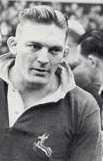Hennie Muller
 | |||
| Muller before the England encounter in 1952 | |||
| Full name | Hendrik Scholtz Vosloo Muller | ||
|---|---|---|---|
| Date of birth | 26 March 1922 | ||
| Place of birth | Witbank, South Africa | ||
| Date of death | 26 April 1977 (aged 55) | ||
| Place of death | Cape Town, South Africa | ||
| Rugby union career | |||
| Playing career | |||
| Position | Number eight | ||
| Provincial/State sides | |||
| Years | Club / team | Caps | (points) |
| Transvaal Western Province |
|||
| National team(s) | |||
| Years | Club / team | Caps | (points) |
| 1949–53 | South Africa | 13 | (16) |
| correct as of 2007-12-26. | |||
| Coaching career | |||
| Years | Club / team | ||
| 1965 | South Africa | ||
| correct as of 2007-12-26. | |||
Hendrik "Hennie" Scholtz Vosloo Muller (26 March 1922 – 26 April 1977) was a South African rugby union footballer. Born in Witbank, Muller is considered one of the greatest South African rugby players, captaining the national side, the Springboks in nine tests, and is a member of the International Rugby Hall of Fame.[1] His usual position was at number eight.
Career history
Muller made his international debut for the Springboks on 16 July 1949, in the starting line-up in the first a four matches against the touring All Blacks. The South Africans won the first test, 15–11, which was played at Newlands. The Springboks' winning ways continued at Ellis Park, when they won the second test 12–6. South Africa made it 3 games to nil with a 9–3 win in Durban. The series was tied up as a four to nil whitewash of the All Blacks, as the Springboks won the fourth encounter 11–8 in Port Elizabeth.
In 1951 Muller skippered South Africa at Murrayfield in Edinburgh, which saw the Springboks run away 44–0 winners, with Muller scoring one try. After defeating Scotland, the Springboks had the tough task of playing the other three home nations, as well as France on the rest of the tour. The Springboks made it two from two at Lansdowne Road, defeating Ireland 17–5. Muller guided the team to a closer victory in the subsequent match against Wales in Cardiff, which saw the Springboks keep the clean winning record on tour 3–0, winning the game 6–3, a South African drop-goal proving the difference between the two sides.
The tour had now entered early January, and the next assignment for the Springboks was to face the English at Twickenham. The Springboks came a step closer to getting a grand slam, defeating England 8–3, with Muller adding five of South Africa's nine points, with a conversion and penalty goal. Having defeated all four home nations, the final task to achieving a grand slam was to defeat the French in Paris. The Springboks ran in six tries to defeat France 25–3, Muller scoring one of the tries, as well as adding a conversion, and thus, South Africa completing a grand slam tour of Europe.
Muller captained the side against the Wallabies for a four test series in South Africa in 1953. Muller scored a try in the opening exchange at Elils Park, which saw the home side win 25–3. The Wallabies hit back in Cape Town, taking the second test 18–14. However South Africa won the next test, 18–8 in Durban. In Muller's final match for the Springboks, played in Port Elizabeth, South Africa won 22–9. Muller would go on to coach the Springboks in 1965. In 2001, he was inducted into the International Rugby Hall of Fame.
Notes
- ↑ "Hennie Muller". rugbyhalloffame.com. Archived from the original on 5 January 2013. Retrieved 26 December 2007.
Bibliography
- Billot, John (1974). Springboks in Wales. Ferndale: Ron Jones Publications.
- Griffiths, John (1987). The Phoenix Book of International Rugby Records. London: Phoenix House. ISBN 0-460-07003-7.
- Parker, A.C. (1970). The Springboks, 1891–1970. London: Cassell & Company Ltd. ISBN 0-304-93591-3.
- Stent, R.K. (1952). The Fourth Springboks 1951–1952. London: Longmans, Green and Co.
External links
- Hennie Muller on genslin.us
- "Hennie Muller". scrum.com. Retrieved 26 December 2007.
- Llewellyn, Dai. "Inducted: England v South Africa (20/11/04)" (pdf). rfu.com. Retrieved 26 December 2007.